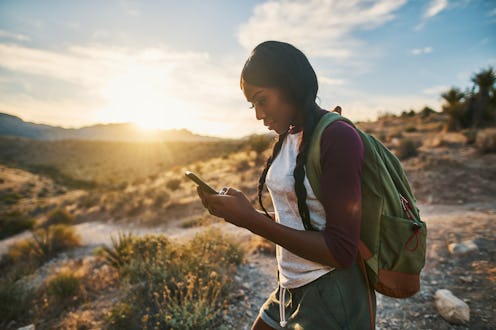Life
What To Know If You're Thinking About Giving Up Social Media For A Little While

When was the last day you spent a full 12 or 24 hours without your phone? You might not even be able to remember a time when you weren't communicating virtually with a majority of your friends and family on any given day. Though it seems borderline fantastical to consider the idea of giving up social media for even a week, it might be a helpful exercise, if only to become more aware of how often you use it in your daily routine.
The relationship between people's mental health and their social media engagement is an ongoing research focus for scientists around the world — and not everyone is finding the same connection between the two. One 2019 study conducted at the University of Kentucky suggested that giving up social media for anywhere from one to four weeks doesn't significantly change a person's mood. The scientists involved in the study concluded that the results "call into question the causal relationship between social media and well-being on the daily level."
However, another 2018 study conducted by scientists at the University of Pennsylvania suggested that people who limit their social media use to 30 minutes or less each day experience a noticeable improvement in mental health. The study monitored 143 undergraduates over the course of a week as they "regularly used" social media, then monitored those undergraduates over the course of an additional three weeks. During that time, a portion of those students were assigned to limit their use of three social media platforms (Facebook, Instagram, or Snapchat) to 10 minutes a day, per platform.
The results of this study revealed a "significant reduction in loneliness and depression" for the group of students who limited their social media use to 30 cumulative minutes a day. Perhaps more interestingly, the study also revealed "both groups showed significant decreases in anxiety and fear of missing out over baseline, suggesting a benefit of increased self-monitoring." In other words, even if you continue using social media, you might see an improvement in your mental health just by trying to be more aware of your own use.
Phoebe Gavin, a social media director and life coach, talked to Bustle about her own experience creating boundaries around social media involvement. "The key part is being really mindful and making intentional decisions about what platforms, topics, accounts, I need to be paying really close attention to in order to do my job well or live my values or achieve my goals," she says to Bustle. "If a platform or an account…doesn’t align with that, then I really try to exert some self control and turn those things off."
Gavin adds, "Over time, it's gotten so much easier to have good boundaries and good personal control." As for how she created boundaries for herself on social media, she notes that she began to ask herself, “'What would happen if I took 15 minutes and didn’t look at this [platform]?' Nothing would happen. 'What if I took 30 minutes, an hour? A day?' Nothing would happen."
If you want to start setting boundaries, Laura Vanderkam, a writer, author, and public speaker on the topic of time management and productivity, suggests that you "make checking social media less automatic and less easy." For example, you can "move icons off the home screen of your phone, or take them off your phone completely," Vanderkam says to Bustle.
Gavin offers a similar suggestion: "Try a week of turning your notifications off altogether, and you will either freak out or check them even more, or you will forget them entirely."
Lastly, consider being more intentional about your off-line life, AKA your real life. "Make your non-screen life more interesting!" Vanderkam says. "If you audition for a community play, and your evenings are filled with rehearsals, you'll naturally spend less time on social media... because you have less time available. Effortful fun has to crowd out effortless fun."
You can always read more about different ways to curb your social media use, too, if you want to try more than one approach.
Studies Referenced:
Hall, J. (2019) Experimentally manipulating social media abstinence: results of a four-week diary study. Journal of Media Psychology, https://www.tandfonline.com/doi/abs/10.1080/15213269.2019.1688171?scroll=top&needAccess=true&journalCode=hmep20
Hunt, M. (2018) No More FOMO: Limiting Social Media Decreases Loneliness and Depression. Journal of Social & Clinical Psychology, https://guilfordjournals.com/doi/10.1521/jscp.2018.37.10.751
Sources interviewed:
Phoebe Gavin, Social Media Director and Life Coach. http://betterwithphoebe.com/
Laura Vanderkam, Author, Writer, and Public Speaker. https://lauravanderkam.com/
This article was originally published on